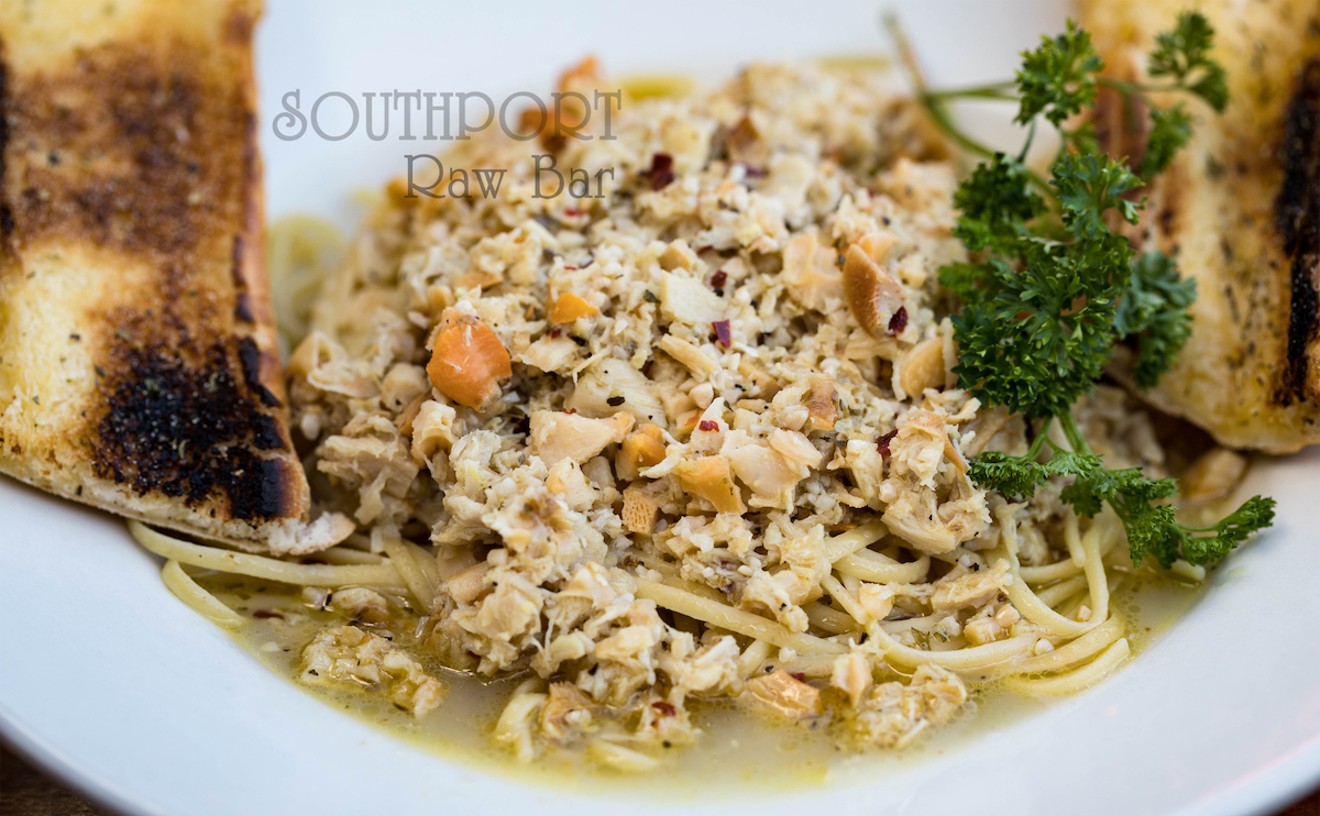Best Farmers' Market in Broward
Tater Town

Forty-four years ago, Joan and Dale Jesus parked their truck full of locally grown fruits and vegetables on Sunrise Avenue and opened for business. They soon moved to an empty lot on the west side of NW 27th Avenue, put up signs that said, "You are entering Tater Town," and watched as their brightly colored umbrellas and tarps attracted a steady stream of neighborhood shoppers in search of fresh produce. Today, Tater Town is a throwback, one of only a handful of daily outdoor farmers markets' still operating in Broward County, and fiercely proud of it. Until Wilma, an enormous Banyan tree planted by the family was the market's icon, its green bulk overshadowing everything on the small lot. The regulars, most of whom have been around as long as the market itself, are still shaken by its loss. But Tater Town is soldiering on, doing battle with Broward County code enforcers over the right to park a farm tractor-trailer while providing its flock of customers, most of whom visit daily from the surrounding neighborhood, fresh produce at remarkably cheap prices. Though Dale has passed on, Joan Jesus still counts out change despite her 71 years, and her son, Randy, plans to keep the Tater Town alive long enough for another banyan tree to grow.
- 329 Northwest 27th Ave., Lauderdale Lakes, 33311 Map
- 954-274-7712
Best French Restaurant
Chez Jean-Pierre
It's official: French is out. South Florida is evidently still nursing a grudge over that silly Iraq thing, because good French restaurants here have become as rare as ivory-billed woodpeckers in a Louisiana swamp. You think you glimpsed a flash of a red-, white-, and blue-striped flag or heard the distant notes of the Marseillaise, but it's an illusion -- that was actually the sound of another basket of freedom fries getting dumped into hot oil. But the grand old pre of la cuisine française is still going strong in Palm Beach, proving once again that money is wasted on the rich. Still, even jaded aristocrats pause for long moments of contemplation and gratitude over plates of Normandy-born Chef Jean-Pierre Leverrier's sautéed sea scallops in brown butter, his homemade foie gras terrine, a dish of roasted duck glazed with honey and thyme, or a perfectly executed Dover sole expertly filleted at your table. With his wife, Nicole, and son David, Leverrier has perfected these dishes over more than a decade, until they're as much a part of the Palm Beach landscape as Mizner architecture and 20-foot hedges.
- 132 N. County Rd., Palm Beach, 33480 Map
- 561-833-1171
Best Farmers' Market in Palm Beach
Woolbright Farmer's Market
Turn-of-the-century foodie buzzwords: locally grown, organic, sustainable, cuisine de terroire. If you live in Santa Monica, California, you merely throw on your yoga pants and traipse down to the daily farmer's market. But eco-friendly virtue is hard to come by in South Florida, unless you happen to live near Boynton Beach. There, the tiny but thriving family-run Woolbright Farmer's Market is selling the kinds of local products that usually get shipped north before we can lay our mitts on them. Like multiple varieties of Florida oranges and grapefruits picked from local trees: You can tell you're getting the real thing because they're plumb ugly on the outside -- pitted, spotty, misshapen -- and heavenly sweet when you cut them open. You'll also want to buy a bucket of giant, locally grown beefsteak tomatoes, sweet Florida corn, organic kale, all kinds of melons, blue and fingerling and new and sweet potatoes, organic pink-lady apples, big bags of fresh basil, and locally bottled lemonades. A Boynton pastry chef provides yummy homemade cornbread, banana cake, raisin and nut loaf, lemon poppyseed pound cake; nutritious (and delicious) giant cookies made from spelt, oatmeal, carrot, and chocolate chips, plus sugar-free and wheat-free muffins. There's organic milk to wash them down with. Plus McCoy's honey from Loxahatchee, millet and flax lavash flatbread made at Tampa's Sami's Bakery, stacks of freshly baked pies from the Upper Crust in Lake Worth, and dried fruit from Nutty Brothers in Pompano Beach. Who knew the examined life was so worth living?
- 141 SW Woolbright Rd., Boynton Beach, 33435 Map
- 561-732-2454
- www.woolbrightfarmersmarket.com
Best Indian Restaurant
Taj

Liz Dzuro
For once, the best is synonymous with the most. In the form of an $8.95 lunch buffet where you can fill and refill your plate with all the spice-redolent delicacies of India: a deliciously gooey sag paneer of spinach and homemade cheese; fragrant eggplant bharta; onion bhaji doused in cream and yogurt sauce; belly-warming channa masala; and creamy spiced peas and potatoes. There's the vegetable korma with cream, tomatoes, and raisins; three kinds of chicken; sweet pickled potatoes, coleslaw, and yogurt-cucumber dahi raitha; and a katchumbar salad of spiced onions, tomatoes, and cucumbers. Then you can return to the buffet table and do the whole thing again, backward this time, adding fruit chutney, hot sauce, and breathtakingly salty pickled vegetables, great for mopping up with endless baskets of handmade bread hot off the griddle -- dense, smoky naan and puffballs of fried poori. Gulab jamun made from scratch comes swimming in rosewater-infused syrup. It's a meal fit for a Delhi Sultan at Untouchable prices.
- 201 SE 15th Terrace #101, Deerfield Beach, 33441 Map
- 954-427-0423
- www.tajindianrestaurantcove.com/#/
Best Expensive Italian Restaurant
Rino's Tuscan Grill

Not many chefs can strike an ideal balance between simplicity and surprise -- they leave you either yawning over another plate of calamari or spooning up pig's-foot ice cream -- but Naples-born Chef Rino Balzano, well-schooled throughout Northern Italy, takes Tuscan classics and brings them up to date. Balzano, known for "miking up" to serenade his customers with Italian arias, isn't shy when it comes to employing the famous game meats of Tuscany, like rabbit and quail, that might seem exotic to American palates. But simply grilled or braised in rich stock with wine and onions, then tossed over a bit of homemade parpardelle or polenta, these dishes become instant favorites, the kind of meals to give you separation anxiety when they're finally over. Rosemary-infused pork chops ($28) and veal chops ($44) smothered with wild mushrooms and cooked over an open flame, a wild mushroom-topped oval of fresh buffalo mozzarella ($12), and a finale of zuccato cream-cake ($9) with a glass of Moscato di Asti ($10), plus a list of 500 Italian wines, are just a few of the great possibilities worth exploring.
- 1105 E. Las Olas Blvd., Fort Lauderdale, 33301 Map
- 954-766-8700
- www.lasolastuscangrill.com
Best Winetastings
Naked Grape Wine Co.

Wilton Drive got a bit classier when Brian BeCraft opened this well-designed store last year. Wines here are grouped by characteristics, such as fruity, earthy, etc., with more than 200 choices for under $25. Helpful placards accompany each selection and describe the wine's origin, flavors, and compatibility with particular foods. That's the kind of detail that makes winetastings at the Naked Grape both enjoyable and enlightening. About twice a month, BeCraft pours samples of 12 to 20 wines related by theme. In January, there were a variety of cabernet sauvignons, and February showcased wines from South America. Shortly before Thanksgiving last year, the tasting focused on wines compatible with turkey, ham, and, for the Pilgrim-inspired, game meats. Tastings cost $10 to $15, depending upon the number of wines offered, and hors d'oeuvres are ample and tasty enough to clear and satisfy any palate.
- 2039 Wilton Dr., Wilton Manors, 33305 Map
- 954-563-5631
- www.nakedgrapewinebar.com
Best Inexpensive Italian Restaurant
Papa Pistola's
For decades, you could count on the checkered tablecloth and the bottle of Chianti, the proprietor who knew the latest dish on everybody who walked in the door, the bread soaking in garlic butter, and the 12 kinds of spaghetti all cooked in the same heavy red sauce. Then, overnight, they were gone. Our cozy neighborhood Italian restaurants morphed into places playing trance music and serving vertical appetizers. Today, your chocolate martinis are brought by tattooed hunks, but the tattoos no longer say "Rose" or "Mama"; they're Sanskrit hieroglyphs that translate to "Ohm." Papa Pistola's is a nostalgic glimpse back to that bygone era when a bottle of wine with dinner set you back 15 bucks instead of 50. From the Dean Martin, Al Martino, and Mantovani record sleeves that decorate the walls to the fried mozzarella, pasta fagiole, and homemade gnocchi to the sincerity of the servers and the very reasonable prices (about $14.95 to $17.95 for the entrées), Papa's not cutting any edges. But he's not cutting corners either.
Best Raw Bar
Southport Raw Bar

Photo by Glenn Govot, courtesy of Southport Raw Bar & Restaurant
Those scary written warnings that accompany servings of un-cooked shellfish are so uninviting, it's a wonder anyone eats raw oysters or clams. Risking hepatitis or vibrio just to swallow something salty and slimy takes a particular breed of cat (or kitten). But raw oysters are, in fact, a delicacy and reputed aphrodisiac, and South Florida's a prime spot for both Gulf and Atlantic varieties. Unlike many other restaurants -- even shacks right on the water -- Southport always shucks oysters to order, instead of letting them sit refrigerated on the half-shell until they develop the texture of rubber cement, the way some establishments do. Observe as plastic milk-crates packed full of the bivalves make their way from coolers in back to tubs of ice at the shucking station. At $9 a dozen (cheaper during happy hour), the oysters fit in well with Southport's no-frills, slightly divey setup. The smoked fish dip and fried offerings (clams, oysters, catfish, scallops, etc.) consistently cost about half as much as you'd find elsewhere but are invariably twice as good; its Philly cheesesteak is enormous and authentic, and beer and wine flow freely (and cheaply). Besides, after more than six years of swallowing those sea-salty little items, we're still alive, healthy, and ready for more.
- 1536 Cordova Rd., Fort Lauderdale, 33316 Map
- 954-525-2526
- www.southportrawbar.com/
Best Fish Sandwich
Tiki Waterfront Sea Grill

Bikers, boaters, and bobos rub beer bellies under the thatched roofs of Tiki's upper- and lower-story bars at the Riviera Beach marina, shaking booty to live music on sunny Sunday afternoons. It's Old Florida meets Eastern Europe: luscious Romanian girls, wearing last-decades' gold eyeshadow and hot pants, maneuver baskets of peel 'n' eat shrimp, hot blue crab dip, and Bahamian conch salad through the throngs. But it's Tiki's crunchy grouper sandwich that keeps reeling you back: a glistening slab of prime catch rolled in panko breadcrumbs, deep fried, and tucked into a pillowy Kaiser roll with tomato, onion, lettuce, and a lemon-struck tartar sauce along with a heap of crisp shoestring fries -- all of it as ideally proportioned as the maiden who serves it to you.
- 200 E. 13th St., Riviera Beach, 33404 Map
- 561-845-5532
Best Jamaican Restaurant
Annie's Fresh Fish and Baked Goods

Good Jamaican and Caribbean food abounds in South Florida. Drive ten minutes from anywhere and you can get decent jerk and oxtails that taste pretty much the same as the ones you had elsewhere. Are they all using the same recipes and sharing one big kitchen? Annie's is one of a handful of places where such thoughts never occur. The jerk is not just tender but scented through and through with peppers, cinnamon, and allspice. Fish are cooked fresh, not ladled from a steam table. Rice and peas are moist and fragrant, not dry and starchy. Even the steamed cabbage has a certain something to it. The sorrel and bracing ginger beer are made on the premises. And save room for dessert: The "Off-the-Chain" spice cake really is.
- 1100 NE Fourth Ave., Fort Lauderdale, 33301 Map
- 954-763-9774





